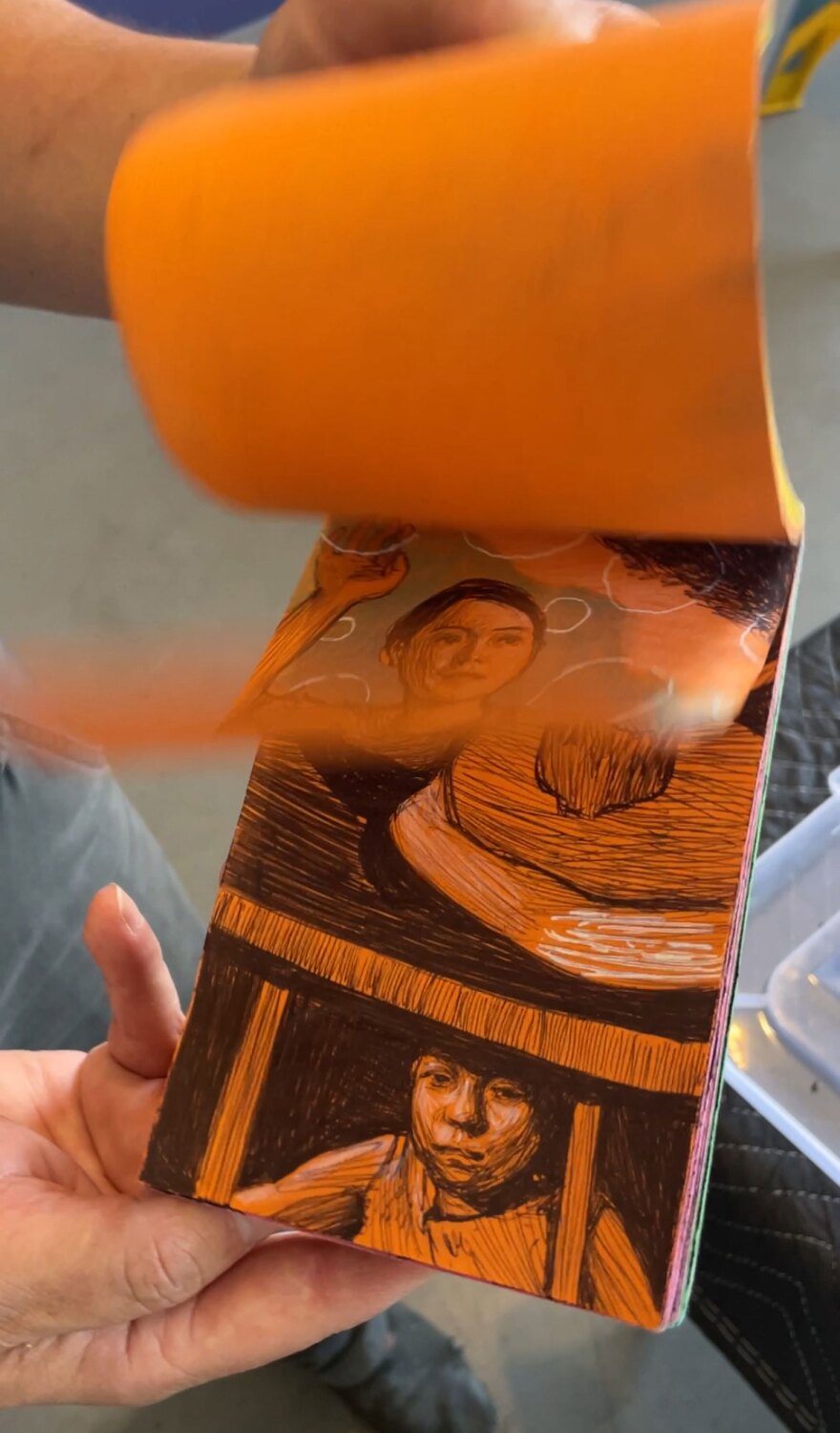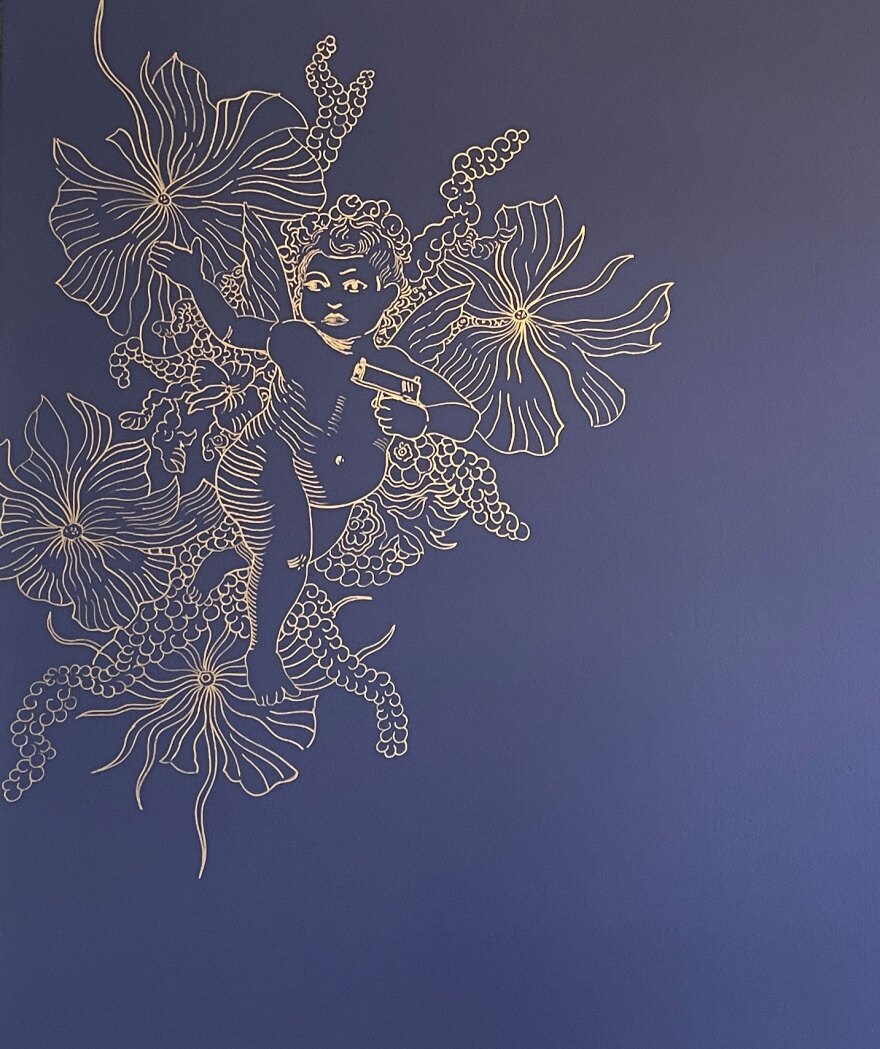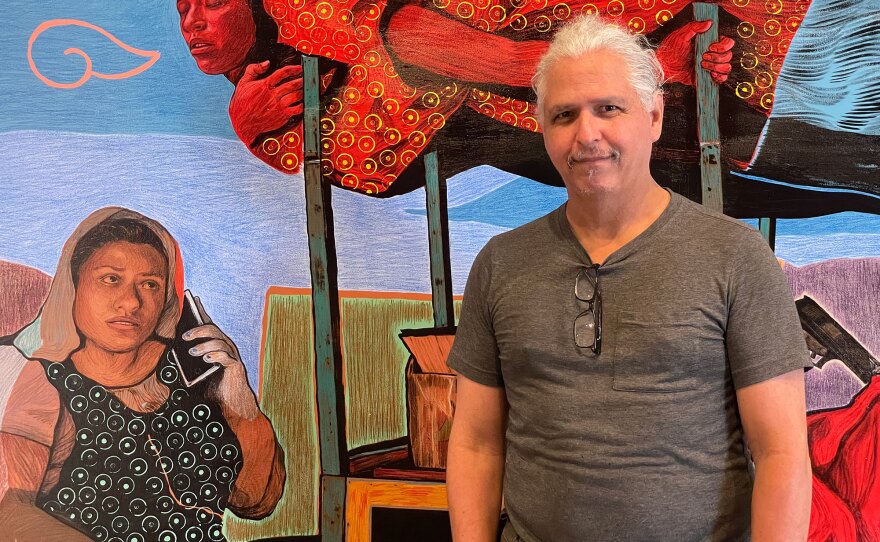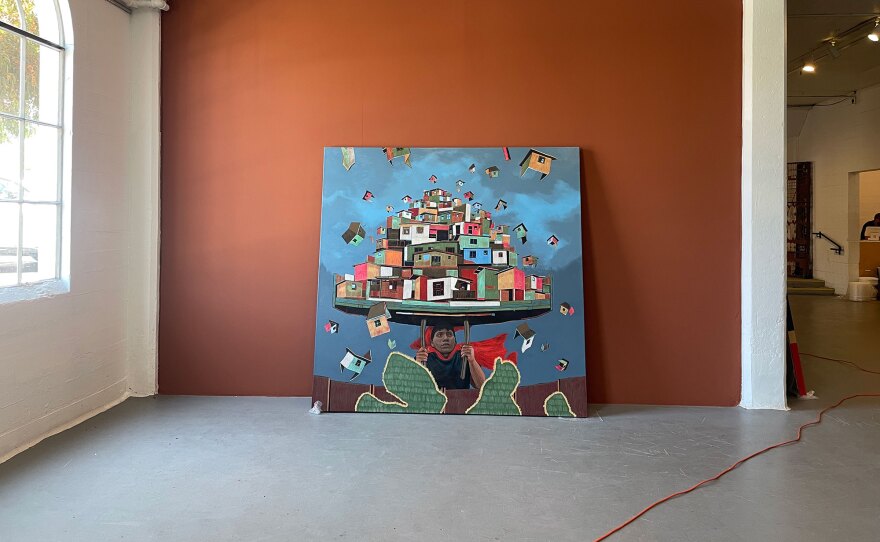On a warm August afternoon, Hugo Crosthwaite stepped back from a vivid, steel-blue wall in the sun-streaked Bread and Salt gallery. In one hand, he held a gold paint pen. In the other, the cardboard backing from the pen's packaging, covered with dabs and blobs of gold. Tapping the tip of the pen against the cardboard to get the paint flowing, he reapproached the wall.
Bright scenes on canvases rest, awaiting installation against each wall of the main gallery — each wall painted a different, earthy hue. Color is everywhere.
Crosthwaite is well-known for his black and white drawings, animations and murals that blend Mexican folklore with cityscapes and vivid portraits of the people that pass him on the streets. But in this new exhibit, he's venturing into color — for the first time.

For every work of art, his process begins with a sketchbook, something he always has with him. It's a practice he's seamlessly honored in his animations — each work celebrating the act of sketching through stop-motion. It began in 2019 when, after a cancer diagnosis, he had to limit the physicality of his art.
"My whole life just got reduced to my little sketchbook," Crosthwaite said in 2021.
But recently, he used up his last sketchbook, and had to buy the only thing available nearby: a book with colored pages. He easily filled it, and decided he could simply approach a canvas in the same way — though it was daunting to depart from black and white.
"How do you start using color when you haven't used color in 30 years? No, I had no idea but I just said well, I'm just gonna do what I do in my sketchbook. I have a color field and inside this color field I'm just gonna draw people you know, in black and white. So then on a canvas, I would feel out these color fields and then just draw characters. And then with colored pencil, kind of unite the whole thing," Crosthwaite said.
The large canvases on view in "Tijuacolor" are a remarkable colorification of his existing, brilliant practice. To achieve the essential mark-making of a sketch, Crosthwaite painted blocks of color on the canvas first, then drew directly on the painted sections.
Each work features modern-day characters in imagined scenes, inspired by folklore, kitsch and what he calls "narco luxury." The adornment on the walls enhances this kitsch.

During the installation in the gallery, Crosthwaite was drawing a golden, shining cherub, nestled in elaborate foliage, and brandishing a gun in one hand. It's the first of the flourish-like murals he wants to fill the gallery.
"This exhibition is kind of like me presenting Tijuana in color and playing with this idea of Mexican folklorism, how, especially Tijuana — you know, I grew up in a curio shop. So then my whole notion of the United States is that as a Mexican I'm selling things to the United States, that's where the dollar is," Crosthwaite said. "I wanted to continue that notion through my work as selling something or presenting something. It's kind of like this idea of luxury, this idea of kitsch, this idea of narco luxury. This idea of how narcos decorate their mansions (in a) very Baroque and ostentatious way. So that it kind of reflects all of that, like this little cupid is holding a gun," Crosthwaite said.

One of the canvases is called "Annunciation," named after the message the Virgin Mary received from the archangel Gabriel, telling her she'd be the mother of Jesus Christ. The woman is holding a phone to her face. Her expression is modern: a bit detached, a bit skeptical. Above her, a vivid red figure floats sideways. A blood-red cloth spills from a nearby gun.
As always, this work started in his sketchbook, when he was out and about, and through his improvisational practice, found its narrative.
"I was drawing this woman with a phone," Crosthwaite said. "Once I did that, okay, you know, the story is coming along. She's holding a phone. Why? Somebody's calling her? Could be Gabriel, no?"
Throughout his career, Crosthwaite has masterfully represented the Tijuana cityscape as a vertical, towering, beautiful cluster of houses and buildings. And in translating that style into color, he adds a new level of detail, allure and story.

In the titular work, "Tijuacolor," a young man is holding the city of Tijuana as if it's a massive pile of merchandise on a rack above his head.
"It's kind of like this story of this guy across the border, maybe he's selling or presenting Tijuana to the United States from this side," Crosthwaite said. "It reminded me of those times, when I drive from San Diego down to Tijuana and you just see the city kind of rise up, you know, this monster of a city — its chaos, and its visual beauty."
While "Tijuacolor" is on view at Bread and Salt, Crosthwaite will also open a new exhibit at Mesa College Art Gallery, "The Rupture of the White Cube," with more works in color there, including an installation of colorful works on paper, stop-motion animation, and a 12' cube-shaped sculpture in the middle of the gallery. The Mesa College show is on view Aug. 19 through Sept. 12.
The cityscape doesn't stop at the edges of the canvas, of course. On the wall where this piece hangs, Crosthwaite has rendered a crowded continuation of Tijuana's hillsides in a silvery mural against a rich, deep orange wall.
It's an all-in approach to color, but Crosthwaite has distinctly pulled it off — in a style that feels quintessential to him.
Details: "Tijuacolor" opens at Bread and Salt with a reception from 5-8 p.m. on Saturday, Aug. 10, and is on view through October. Gallery hours are 11 a.m. to 4 p.m. Tuesday through Saturday. Bread and Salt Gallery, 1955 Julian Ave., Logan Heights. Free.






